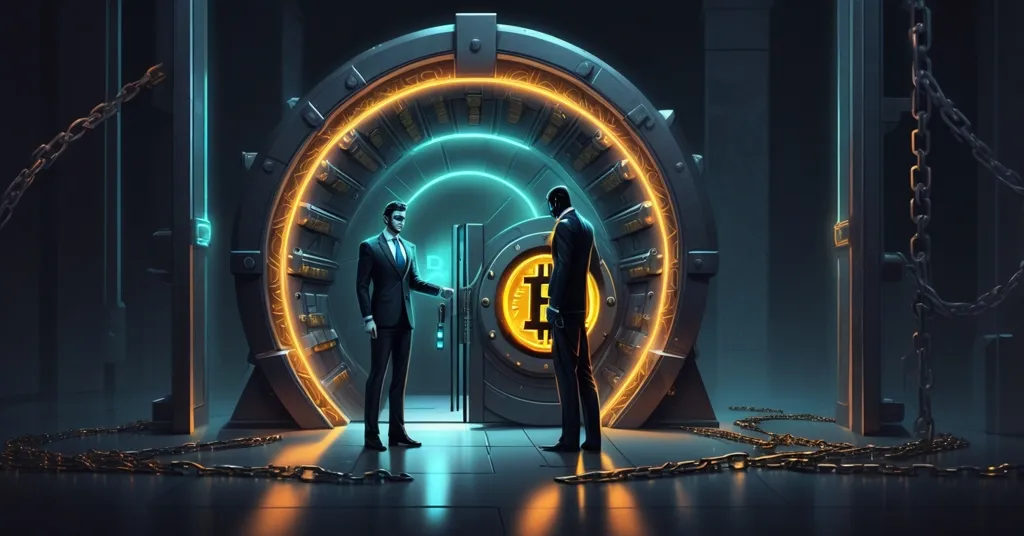Binance-BBVA Partnership: Off-Exchange Custody to Rebuild Crypto Trust or Centralization Trap?

Binance Joins Forces with BBVA for Off-Exchange Custody: A Trust Reset or Compromise?
Binance, the titan of cryptocurrency exchanges, has inked a landmark deal with Spain’s banking heavyweight BBVA to provide off-exchange asset custody for its clients. This partnership, leveraging BBVA’s credibility to secure funds in U.S. Treasuries, aims to rebuild investor trust scarred by past crypto catastrophes like the 2022 FTX collapse, while signaling a deeper fusion of traditional finance and digital assets.
- Binance partners with BBVA to hold client funds in U.S. Treasuries, reducing counterparty risk.
- Deal follows FTX fallout and Binance’s $4.3 billion U.S. fine in 2023, targeting trust issues.
- BBVA boosts crypto adoption in Spain amid EU’s clearer regulatory framework under MiCA.
Rebuilding Trust with Off-Exchange Custody
The crypto industry still reels from the 2022 implosion of FTX, a disaster that locked away billions in customer funds and exposed the fragility of centralized exchanges. Add to that Binance’s own baggage—a staggering $4.3 billion fine paid in November 2023 for regulatory violations in the U.S.—and it’s clear why trust is in short supply. Now, nearly two years after FTX’s collapse, Binance is taking a bold step by partnering with BBVA to store client assets off-exchange in U.S. Treasuries. For the uninitiated, U.S. Treasuries are government-backed securities, often dubbed the safest investment on the planet, used here as a buffer against the risk of exchange failure. Binance accepts these as trading margin, meaning clients can still trade while their funds sit in a fortified financial vault, slashing counterparty risk—the chance that an exchange goes bust and takes your money with it.
Think of counterparty risk as handing your life savings to a shady middleman with no guarantee they won’t vanish overnight. FTX, under Sam Bankman-Fried, turned that nightmare into reality with a masterclass in how to torch billions. By contrast, parking funds with BBVA, a bank with centuries of financial gravitas, is Binance’s way of saying, “We’re done gambling with your assets.” A source close to the deal, as reported in a recent update on the Binance-BBVA partnership, nailed the sentiment:
“If you say BBVA, people are like ‘box tick, next’.”
In other words, BBVA’s name alone is a stamp of legitimacy, a far cry from the cowboy antics that have plagued crypto’s reputation. But let’s not pop the champagne just yet—this move, while pragmatic, raises questions about whether we’re swapping one form of centralization for another. More on that later.
BBVA’s Push into Crypto: Lowering Barriers in Spain
While Binance leverages BBVA to polish its image, the Spanish bank itself is no stranger to the digital asset game. Fueled by clearer regulations in the European Union, particularly the Markets in Crypto-Assets (MiCA) framework—a set of rules rolled out in 2024 to protect investors and legitimize crypto operations—BBVA has gone all-in. Spain, under the watchful eye of its financial regulator CNMV, adopted MiCA early, positioning itself as a crypto-finance hub ahead of EU peers like France or Germany. On July 4, 2025, BBVA launched Bitcoin (BTC) and Ether (ETH) trading and custody for retail clients directly through its mobile banking app, a seamless integration that skips the tech headaches of external wallets or risky decentralized finance (DeFi) protocols, as detailed in this analysis of BBVA’s crypto expansion. For high-net-worth private banking clients, the bank even suggested allocating up to 7% of portfolios to crypto—a gutsy move for a legacy institution.
What sets BBVA apart is its focus on simplicity and security. Unlike many exchanges where hacks or user error can wipe you out, BBVA handles custody in-house with bank-grade measures—think encryption, cold storage, and multi-signature safeguards far stricter than the average crypto platform. For the everyday Spaniard, buying Bitcoin is now as easy as a bank transfer, no tech wizardry required. This user-friendly approach could be a game-changer for mainstream adoption, and Binance’s partnership taps directly into that trust pipeline, potentially drawing in cautious investors who’ve been burned before or never dared to jump in, further explored in this piece on the impact of such partnerships. Still, it’s worth asking: does this spoon-fed entry dilute the DIY ethos that Bitcoin was built on?
Regulatory and Political Tailwinds Fueling the Shift
This Binance-BBVA alliance isn’t happening in isolation. The regulatory landscape is finally cutting through the red tape, giving banks like BBVA the green light to dive into crypto without fear of legal landmines. MiCA in the EU has been pivotal, offering a harmonized rulebook that Spain embraced swiftly, with CNMV approvals as early as March 2025. Across the pond, evolving guidelines from the U.S. SEC, though slower and messier, are also nudging traditional finance toward digital assets. Meanwhile, political sentiment is adding rocket fuel to the market. Pro-crypto rhetoric from the Trump administration has driven Bitcoin to record highs in late 2024, with trading volumes exploding and institutional interest spiking. While concrete policies remain elusive, the vibe alone has banks smelling opportunity—turns out, even century-old institutions can’t resist the shiny allure of digital gold. Greed or vision? You decide. For more on how Binance is navigating these trust challenges with banking partnerships, check this deep dive into crypto trust solutions.
Binance itself isn’t new to off-exchange custody either. Spurred by customer outcry post-FTX, it began partnering with Swiss banks like Sygnum and FlowBank last year for third-party solutions, moving away from in-house systems and Ceffu, a custodian U.S. authorities claim is too cozy with Binance for true independence. The BBVA deal, though, feels like a louder statement—hitching to a global banking titan over niche players screams “safety first” in a way smaller partnerships couldn’t, with specifics outlined in this report on the custody arrangement. But competitors like Coinbase and Kraken are also in this race, with Coinbase notably teaming up with traditional finance for custodial services. Binance isn’t innovating here; it’s catching up to an industry standard born from necessity after too many funds went poof.
Lingering Shadows: CZ’s Legal Battle with FTX
Even as Binance builds bridges with traditional finance, shadows from its past threaten to muddy the waters. Co-founder Changpeng Zhao (CZ), now based in the United Arab Emirates, is locked in a $1.76 billion lawsuit with the FTX bankruptcy trust over a 2021 share repurchase deal involving payments in BUSD (Binance’s stablecoin) and FTT (FTX’s native token). FTX claims the transfers were fraudulent, a desperate clawback to salvage funds for creditors still reeling from the 2022 collapse. CZ is fighting to dismiss the case in Delaware court, arguing it lacks jurisdiction over him as a non-U.S. resident and slamming the accusations as baseless, as covered in this update on CZ’s legal battle. He’s even taken a swipe at FTX for trying to “nonsensically blame” him and Binance for Sam Bankman-Fried’s misconduct:
CZ criticized FTX’s efforts to “nonsensically blame” him and Binance for Bankman-Fried’s misconduct.
This isn’t just a petty spat; it’s a reminder that crypto’s dirty laundry still stinks up the room. If mishandled, the lawsuit could dent Binance’s shiny new trust narrative, even if CZ’s jurisdictional defense—bolstered by the offshore nature of the transactions—seems strong. Potential outcomes range from dismissal to a costly settlement, which could strain Binance’s finances or cast a shadow over BUSD’s credibility. Clawbacks or not, FTX’s mess is a stink bomb Binance needs to dodge while it’s busy courting legitimacy with deals like BBVA’s.
Decentralization Dilemma: A Necessary Evil?
Stepping back, let’s play devil’s advocate. Off-exchange custody with a bank like BBVA might shore up safety, but does it betray crypto’s core ethos? Bitcoin, born from Satoshi Nakamoto’s vision of “be your own bank,” was meant to cut out middlemen—banks, governments, anyone who could control or seize your wealth. Now, we’re handing funds to a traditional institution, trading one form of oversight for another. Are we just rebuilding the same flawed system Bitcoin sought to disrupt, only with a blockchain veneer? For Bitcoin maximalists, this feels like a gut punch to decentralization’s ideals, a concern echoed in discussions on platforms like Reddit regarding trust issues.
On the flip side, pragmatism demands compromise. Mass adoption won’t happen if exchanges keep imploding or if newbies fear losing everything to a hack. Banks like BBVA bring stability and credibility, a bridge to onboard millions who’d never touch a hardware wallet. Data backs this up—since BBVA’s retail crypto launch in Spain, early reports suggest thousands of users have signed on, dwarfing adoption rates of standalone exchanges in the region. Compare this to other banks like JPMorgan, which offers crypto exposure through ETFs, or Goldman Sachs, dipping into blockchain tech—traditional finance isn’t just flirting with crypto; it’s proposing marriage. Still, the risk lingers: what happens when systemic flaws of banking—like government bailouts or asset freezes—creep into crypto via these partnerships? It’s a tightrope walk between trust and true freedom, with some pondering how such arrangements impact investors, as discussed on Quora about banking and crypto safety.
What’s Next for Crypto-Banking Hybrids?
Looking ahead, the Binance-BBVA tie-up is likely just the tip of the iceberg. Expect more exchanges to cozy up with banks as off-exchange custody becomes table stakes post-FTX. Banks themselves might go further—imagine BBVA or peers launching proprietary blockchains or stablecoins, blending their infrastructure with crypto’s innovation. For Bitcoin, this could solidify its role as digital gold, a store of value backed by institutional muscle, while altcoins like Ethereum carve out niches in smart contracts and DeFi that Bitcoin doesn’t touch, a topic often referenced in broader overviews of platforms like Binance’s history and operations. Yet, the dark side looms—regulatory whiplash, scams, and volatility aren’t disappearing overnight, no matter how many suits join the party. This hybrid model is a step toward legitimacy, but the road is paved with potholes.
Key Questions and Takeaways on Binance-BBVA Partnership and Crypto Trust
- What does the Binance-BBVA partnership mean for crypto investor trust?
It’s a significant push to restore faith by securing client funds with a reputable bank, directly addressing fears from disasters like FTX’s 2022 collapse through safer asset storage. - How does off-exchange custody protect Bitcoin and crypto investors?
By holding assets in U.S. Treasuries via BBVA, it minimizes the risk of loss if an exchange fails, offering a safety net far stronger than on-exchange storage. - Why are EU regulations like MiCA driving banks into crypto markets?
MiCA provides a clear legal framework, enabling banks like BBVA to launch Bitcoin and Ether services with confidence, especially in proactive hubs like Spain since 2024. - Could legal battles like the FTX lawsuit derail Binance’s progress?
The $1.76 billion claim risks tarnishing Binance’s image if unresolved, though CZ’s dismissal push calls out FTX’s accusations as a desperate overreach. - Is political crypto support, like from the Trump administration, sustainable?
Pro-crypto sentiment has spiked Bitcoin prices and bank involvement in late 2024, but without firm policies, it’s a fragile boost for long-term growth. - Does reliance on banks like BBVA undermine crypto’s decentralized roots?
It’s a practical trade-off for safety and adoption, yet purists argue it swaps one central authority for another, drifting from Bitcoin’s original vision of financial sovereignty.



